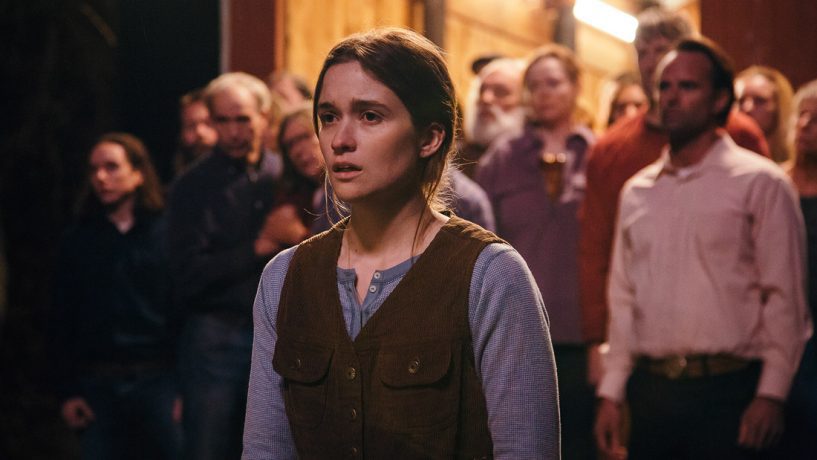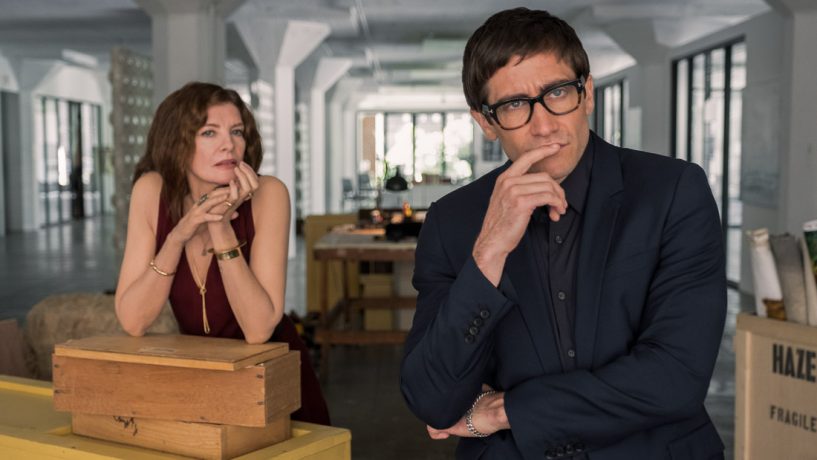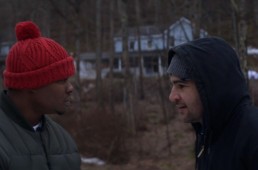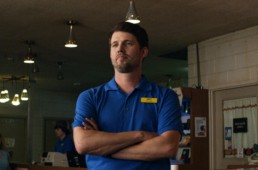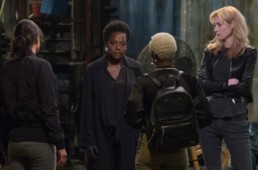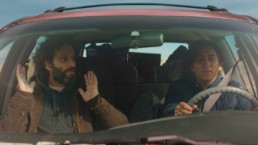What We're Seeing at Sundance 2019
This week marks one of our favorite annual events, the Sundance Film Festival, and Morgan and I couldn’t be more excited! Being our third year covering the fest for Cinemacy, we're more than ready to be back in Park City, Utah taking in all the incredible films that range from directorial debuts to special screenings and world premieres. Here’s a list of films that we've secured tickets to see, and that we can't wait to report back to you about.
Be sure to follow Cinemacy on Instagram, Facebook, and Twitter so that you can get the ground report on everything we do, and we'll be updating non-stop.
Native Son directed by Rashid Johnson
Why we're excited:
A few things to be excited about here: this is the feature film debut from Rashid Johnson, one of today's renowned visual artists whose work spans multiple mediums (sculpting, drawing, painting, you name it). Native Son, a contemporary reworking of Richard Wright’s 1940 novel, starring Ashton Sanders (teenaged Chiron from last year's Best Picture winner Moonlight) as a young African American man caught up in an accidental death which has him navigating through complex social forces.

Honey Boy directed by Alma Har'el
Why we're excited:
As a former child star-turned-blockbuster leading man, Shia LaBeouf has challenged not only Hollywood conventions, but the art world as a whole. This is why we can't wait for Honey Boy, LaBeouf's screenwriting debut that tells the story of young child star – Otis – who, after making it big on a popular children's television show, still has to live under the control and abuse of his father's guardianship (with LaBeouf starring, we see autobiographical elements at play). There are intense performances by Noah Jupe (A Quiet Place) and Lucas Hedges (Ben is Back), who both play Otis at different stages in his life, and this one's sure to be one of the buzziest of the fest.
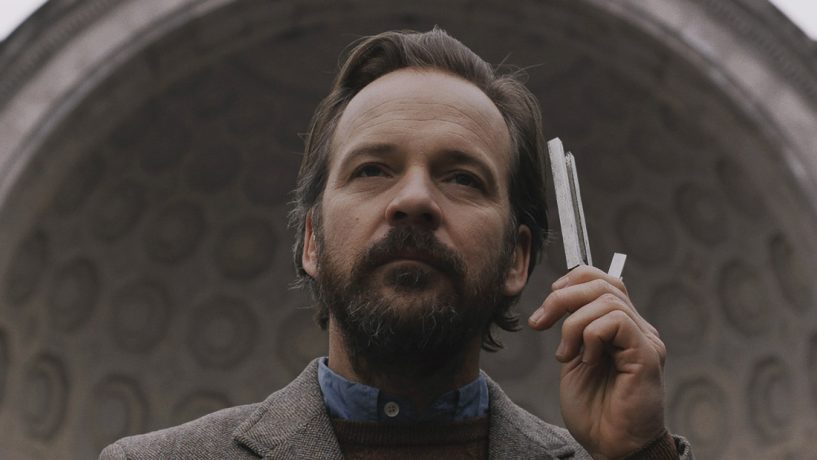
The Sound of Silence directed by Michael Tyburski
Why we're excited:
How's this for one of the most out-there premises? Self-taught scientist Peter (Peter Sarsgaard) works in New York as a “house tuner”–a unique, highly specialized profession he’s invented. Clients approach him with troubles like depression, anxiety, or fatigue, which he aims to cure by extensively analyzing their homes’ acoustic characteristics until he identifies some sonic combination (a radiator mixed with a kitchen appliance, for instance) that is altering their mood. That is, until he meets Ellen (Rashida Jones), who is experiencing exhaustion.
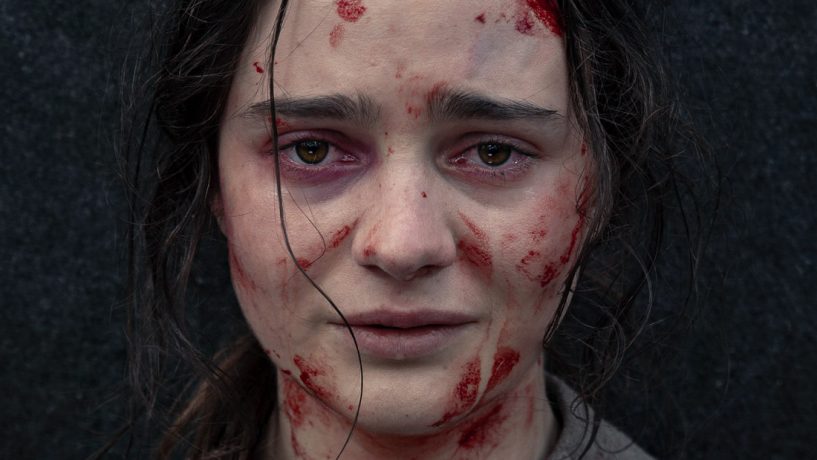
The Nightingale directed by Jennifer Kent
 Why we're excited:
Why we're excited:
The Babadook was absolutely one of the scariest movies to come out in recent years. So it's without question that I'd be seeing whatever the next film was to come from the nightmarish mind of Jennifer Kent, and this one sounds just as ghastly: about The Nightingale, the Sundance web site says "with horrors around every corner, Jennifer Kent’s new nightmare will traumatize the weak of heart, but those willing will discover a majestic achievement most striking in its haunting moments of grace."
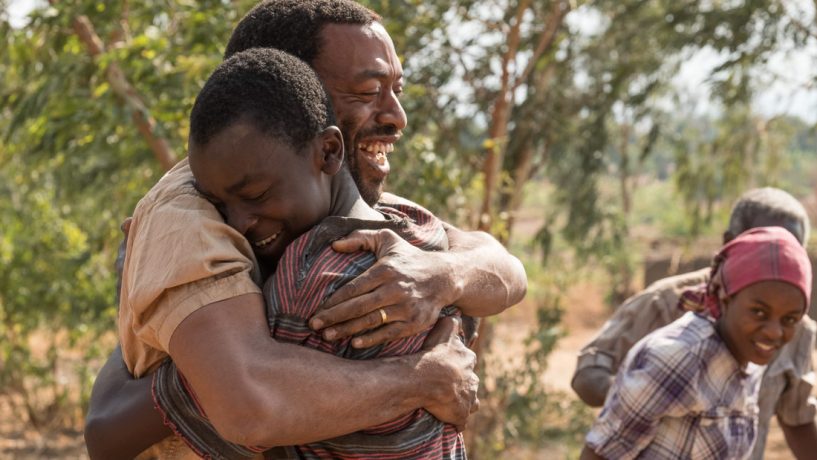
The Boy Who Harnessed the Wind directed by Chiwetel Ejiofor
Why we're excited:
Having captivated and entertained audiences in films like 12 Years a Slave and Marvel's Doctor Strange, Chiwetel Ejiofor is a major force in Hollywood. He makes his directorial debut here, bringing the true story of young William Kamkwamba to the big screen. When famine strikes the rural city of Malawi, Kamkwamba – displaced from school – must sneak past his father (Ejiofor) to attempt to build the town a windmill pump to irrigate the land. Seeing this story of a character's hope and perseverance will make this an inspiring film to see amidst everything else we'll be watching.
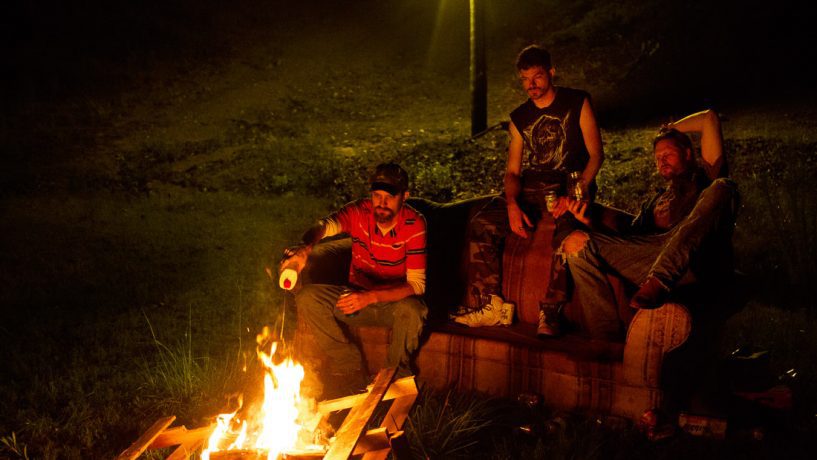
The Death of Dick Long directed by Daniel Scheinert
Why we're excited:
In 2016, the director team DANIELS won Best Director at the Sundance film festival for their Daniel Radcliffe-starring farting corpse comedy Swiss Army Man. While we only get one half of the director-team DANIELS here (Daniel Scheinert, self-proclaimed as "the redneck half"), we're seeing Scheinert in his first solo feature film which we can only imagine will be as equally a creative and imaginative outing. Fun fact: Scheinert decided to star in the film "because screenwriter Billy Chew dared him to."
Them That Follow directed by Britt Poulton and Dan Madison Savage
Why we're excited:
Them That Follow sounds like a gripping work from a pair of filmmakers who are making their directorial debut. The story of an isolated community of Pentecostal snake handlers in the rugged wilderness of Appalachia, all must testify before Pastor Lemuel (Walton Goggins) and God alike. An amazing and talented cast rounds out the film, including Alice Englert, Olivia Colman and Thomas Mann (who both starred in 2015's Grand Jury Prize winner Me and Earl and the Dying Girl).
Velvet Buzzsaw directed by Dan Gilroy
Why we're excited:
Dan Gilroy and Jake Gyllenhaal are re-teaming after the unnerving psychological thriller that was Nightcrawler, and this film looks even more insane. A hallucinatory nightmarish satire of the elitist art world, Velvet Buzzsaw is no doubt one of the must-see movies of the fest (Velvet Buzzsaw will be available to stream on Netflix starting February 1st).
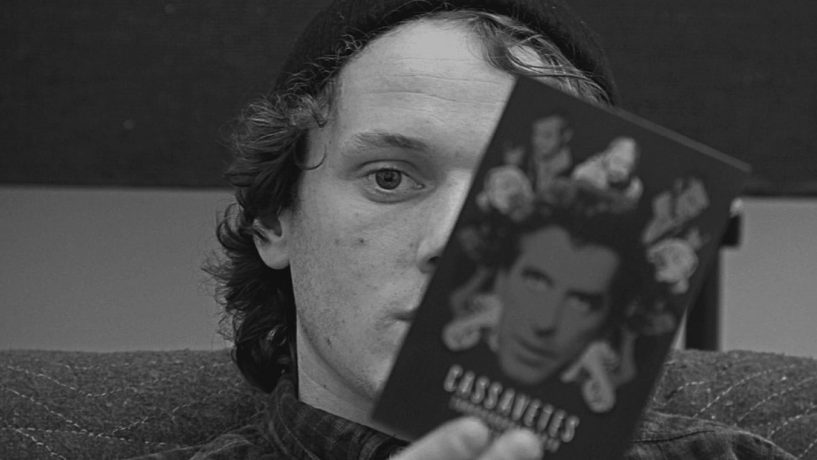
Love, Antosha directed by Garret Price
Why we're excited:
You may know Anton Yelchin from such movies as Star Trek, Like Crazy, and Charlie Bartlett. I knew Anton Yelchin from the improbable yet incredible experience of being in the same philosophy class with him at Santa Monica College years ago. During that short time that I would see him in class, where he displayed incredible intellect and curiosity, and it was clear that he was a caring and bright person. I, like the rest of the entertainment industry, was devastated to hear of Yelchin’s untimely passing in 2016. This documentary looks to celebrate the life of this beloved Sundance stand-out and I know it will be one of the more sobering but special screenings that will leave me both moved and inspired.
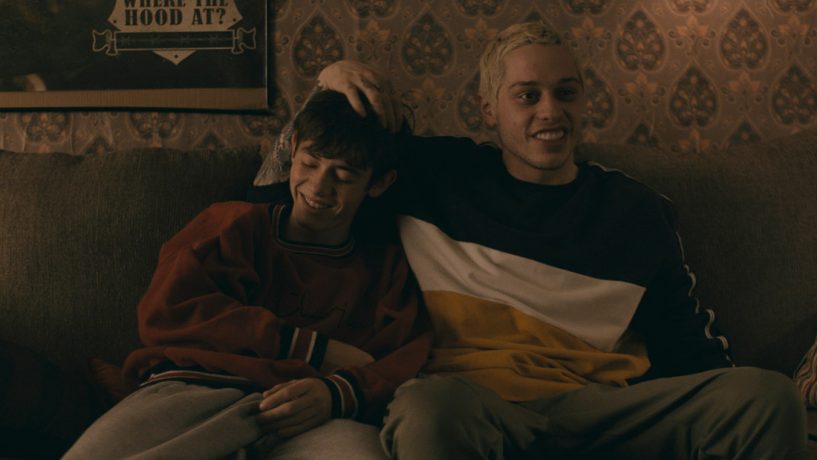
Big Time Adolescence directed by Jason Orley
Why we're excited:
"It" boy of the moment Pete Davidson makes his first major on-screen acting debut, which will be sure to draw audiences who are curious to see how his comic chops hold up outside of SNL and stand-up.
'Tyrel' Review: Odd Man Out
We've all had that feeling of being out of place, of feeling uncomfortable in a group of people that you don't know.
But when that feeling of exclusion is fueled by what one attributes to be the isolation of their race, that feeling becomes an even more palpably disturbing one. Racial identity and tension also happens to be a subject matter white-hot in today's cultural conversation and is the concept that writer and director Sebastián Silva explores in his latest film, Tyrel.
Following in the footsteps of Get Out
The story of a man of color feeling out of place during a drunken weekend away with the boys, the easy first comparison to make might be to last year's smash horror flick Get Out – which is not far off when comparing both movie premises alone. But when all is said and done, Silva's micro-budget movie doesn't deliver on any of the tension-filled threads that it teasingly dangles, which is only a little bit of a let-down knowing that Silva can do horror movies as seen in 2013's Magic Magic starring Juno Temple and Michael Cera.
A literal dude-fest of a movie
An altogether dude-fest of a movie, Tyrel explores what it feels like to be the odd man out. Tyler (Jason Mitchell) – not Tyrel, as new acquaintances mistakenly call him upon botched introductions – agrees to a weekend away with friends of a friend (Christopher Abbott) where he meets the birthday boy (Caleb Landry Jones) and rest of the guys, all buffoonish dudes fuming out leftover college partying as they pour whiskey and roll joints, leaving Tyler to smile sheepishly along.
More friends arrive (all white, or Chiléan) including Alan (Michael Cera), a wealthy jerk who touches on race in the movie's more obvious moments – he wears a wet-suit and jokes to the group that he's the second person of color at the party – to which Tyler's discomfort is felt further, prompting him to outrace the gang in consuming more Irish coffees and joints and end up in dizzying paranoia.
Quick and dirty filmmaking with some of today's best young actors
When one sifts past the disappointment of the film's essentially "non-plot", one is able to see that Tyrel might be Silva's most rich character study yet. Silva, with execution from his DP Alexis Zabe, shoots most of, if not all, of the film handheld, maneuvering around freely and untethered to capture raw, authentically felt performances from each of his actors, who are among some of the best young actors working in film today. And while Tyrel also feels like the most limited in scope compared to his other films, this style of quick and dirty filmmaking lends well to Silva's preference to make movies with his friends on the cheap.
Full of frat-boy machismo energy
Tyrel executes on the sense of isolation and feeling out of place, but the evidence supports that the movie isn't exactly politically charged with overt racism (thinly veiled racism?) that the friends evoke. Really, frat-boy machismo energy is the main offender here, and I would actually be hard-pressed to find a woman who didn't feel isolated themselves watching this male-aggression movie in what might be an ironic twist. Notably, Tyrel's entry into this year's U.S. Dramatic Competition category at Sundance makes Silva the first person to have a movie play in all six major categories at the festival, which might end up being the film's most noteworthy accomplishment.
'Tyrel' is not yet rated. 86 min. Opening this Friday at Laemmle's Monica Film Center.
This review originally ran on January 25, 2018, during the Sundance Film Festival
'When Jeff Tried to Save the World' Review: Living Boldly, in a Bowling Alley
We're all a hero in our own heads.
For the introverts of the world, being a hero is a fantasy that plays out more often in dreams than in reality. It's certainly how we see Jeff, the socially awkward manager of Winky's World bowling alley, live his days as the overseer of his under-attended place of employment. When withdrawn Jeff learns that his beloved bowling alley is set to close, he is forced to acknowledge his socially reclusive lifestyle and figure out how to save the world- his world. In the new film When Jeff Tried to Save the World, first-time feature filmmaker Kendall Goldberg takes a familiar premise and adds fresh elements – an 8-bit arcade style energy (which worked for Scott Pilgrim vs the World) and smart depictions of her lead hero's anxieties (brought to life by Jon Heder) – that make for a fun watch.
When life's in the gutter...
When the "Open" sign of the unattended bowling alley, Winky's World, stops working, it's the writing on the wall of what's to come. Winky's owner Carl (Jim O'Heir) breaks the news that the bowling alley is set to sell which forces Jeff, a former computer engineer turned undervalued manager, to confront his stagnant place in life. At this point in life, he's isolated everyone, including his family and sister Lindy (Anna Konkle) but with the help of his comically underachieving co-workers Stanford (Brenden Meyer) and Frank (Steve Berg), Jeff finds that saving Winky's might also save his own life.
First-time feature
This story of an introverted loner trying to save his place of employment – and in that process finding the courage to live – is a familiar template for any story, but credit co-writer Rachel Borgo and Jeff's director, Kendall Goldberg, who highlights enough moments to make this movie more than what you might expect. She makes her humble lead hero more than a caricatured and quiet guy by showing his crippling anxieties as a real mental illness that he must deal with (anxiety seems to be a growing ailment and fear most millennials might even admit to sharing). But it's still good fun, with Goldberg showing her comic range depicting Jeff's mental episodes as video game fantasy sequences that come to life with impressive cinematography by Nico Aguilar.
Jon Heder, nerd hero
Goldberg knows how to play to the strengths of her leading star, making Jon Heder (who made Napolean Dynamite a household name) more than just a caricature this time around. Jeff's obsessive points-racking of arcade scores is fun character development, but this coupled with seeing his phone notifications to take his medication show that he's not just another one-dimensional character. While Heder doesn't have as many quirky and quoteworthy one-liners as his dynamite nerd did (personally, I would have loved if the film found more ways to up his onscreen comic chops), Heder is still able to show that he can carry a movie, bringing a natural energy to the screen whenever he shows up.
High score
Layered with an 8-bit influenced synth score by Hannah Parrott, When Jeff Tried to Save the World is a fun time and high score for both Jon Heder and director Kendall Goldberg alike. There's a wisdom here that reminds us that we don't always have to end up saving the world to be successful – sometimes being brave enough to try to is enough.
93 min. 'When Jeff Tried to Save the World' is not rated. Now streaming on VOD.
https://www.youtube.com/watch?v=OpJEQ1dWpDY
'Vox Lux' Review: Pop Goes the World
Listening to pop songs brings about a rush of feel-good happiness to listeners, but when thinking of it as an engineered product of an industry, it might also be seen as a highly-concentrated construction of fantasy for consumers to buy into for momentary escape. This relationship between the artificiality of pop music and the culture that empowers it is what director Brady Corbet explores in his new movie Vox Lux, a fictional portrait of a pop star set in modern America. With bold and unflinching storytelling, as well as mesmerizing visuals and performances, Vox Lux is one of the most powerful films I've seen this year.
A pop portrait with an inventive structure
Vox Lux is a portrait of the rise of a pop star, but that's largely just the story that allows the movie to mirror this twenty-first-century America where entertainment, image, and pop culture hold all value. Vox Lux has a storybook-like quality, where meta elements such as its three-chapter structure and omniscient narration by Willem Dafoe give it lyrical quality, but that also includes its significantly darker tone (which audiences should brace themselves for as seen in the film's opening sequences).
Our future pop star – young Celeste (Raffey Cassidy) – was born from darkness. After being the sole survivor of a horrific deadly rampage, the soft-spoken New Jersey native is thrust into the national spotlight as the face of a nation's sorrow and strength. Poised and collected, we see that Celeste not only has words of honest strength to share, but music in her heart as well, and an original song co-written by her sister Eleanor (Stacy Martin) soon becomes a national anthem to a grieving and shaken country. With the guidance of a new manager (Jude Law), Celeste and her sister are introduced to a whole new world of entertainment and all that it brings.
Natalie Portman is transfixing
We see young Celeste go through the ropes – recording in the studio, dealing with her publicist (Jennifer Ehle), and further entrenching herself in the debauchery of the industry, but it's when Vox Lux jumps years ahead that we find present-day Celeste (Natalie Portman), no longer a novice of the pop music machine but now its biggest superstar. Although years have passed, the film plants us back into the present day on the day of another horrific rampage, sending a tour-bound Celeste back into national headlines through comments to reporters (Christopher Abbott). We've seen Natalie Portman embrace against-type roles before including her Best Actress award-winning performance in Black Swan, but in Vox Lux she is a full-on diva, playing every bit the self-obsessed and drug-dependent celebrity that one can imagine. It's a terrific performance that sees Portman play the full range of pop stars and should be remembered this Awards season.
Be ready – it's shocking
Audiences should be warned that Vox Lux depicts horrific events in vivid detail. Rampages with firearms are shocking, but only serve to show what it is that pop music tries to do – which is what young Celeste wisely notes: "I make pop music to make people feel good."
The film's original songs were written by Sia
Vox Lux reaches its end and climax with a full-on immersion into rock concert world, not dissimilar to Bohemian Rhapsody. The original music in this concert, as well as throughout the whole song, is done by artist and hit-maker Sia. For a movie that's about pop music, this movie needed to have good songs, and Sia is great.
'Amateurs' ('Amatörer') Review: Youngsters Make a Movie
There's a certain charm about a first-time filmmaker's debut.
Moreover, there's a charm to movies about first-time filmmakers, usually showing the humorous divide between their technical gifts (or lack thereof) and their indefatigable spirit to tell their story- their wild ambitions exceeding actual capabilities. To this point, the worse – or, less "professional" those characters' movies end up being (think Tommy Wiseau's The Room or Kyle Mooney's underseen Brigsby Bear), the more endearing these stories tend to be for the audience. The light-hearted Swedish comedy Amateurs (Amatörer) enters this storytelling space, showing rebellious youngsters who don't let talent get in the way of telling their story.
Upon hearing news of a German superstore considering moving their business into the sleepy Swedish town of Alafors – which would inevitably provide a big boost to their local economy – the city council looks for ways to attract the conglomerate, but on a shoe-string budget. It's the spirited Musse (Fredrik Dahl) who thinks of sourcing local students to create a welcome video of the city, an idea that is taken on by rebellious best friends Aida (Zahraa Aldoujaili) and Dana (Yara Aliadotter). They use their phone cameras and selfie sticks to explore the city and capture the magically mundane moments, including interviews with the hard-working locals who make up the city.
...[Amateurs] shows the special quality of a community and city that sometimes can only be captured by kids.
What makes Amateurs more than just a light-hearted comedy about first-time filmmakers is that it uses this set up to investigate current day economic themes that are part of the anxieties of globalization. Aida and Dana interviewing both local leather tanners as well as low-income shoppers about what it would be like if the megastore were to move in – all captured in hand-held and shaky home-video style footage – gives an innocence to their curiosity but gives the films a documentary-like blend that offers some unexpectedly profound insight. And seeing the two best friends having to acknowledge the divide in their own personal economic upbringings furthers their own understanding of their place in the economy and life at large.
Amateurs is good for easy viewing, though it suffers a bit from its own "amateur" quality.T here are a few moments in the film that truly stand out, like when a simple string arrangement accompanies why adding dish soap to fountains are always a good idea even if it's against the law – shows the special quality of a community and city that sometimes can only be captured by kids.
102 min. Amateurs (Amatörer) is not yet rated.
https://youtu.be/qIAg2lVDBEI
'Widows': A High Stakes Heist
There's no reason to skirt around it: Widows is rock-your-socks-off, absolute power-house filmmaking – the likes of which just don't get made as much as they should.
It's totally gripping, edge-of-your-seat fare that is elevated with its arthouse sensibilities. Widows is the type of movie that you forget can even be this good for the very reason that, well, these types of movies don't get made very much anymore – those being the elevated big screen genre movie for adult audiences. Not since The Dark Knight has a movie felt so commercially and artistically composed – and for both being movies about vigilantes seeking their own brand of personal justice, it somehow feels to be an appropriate comparison.
A wickedly pulpy plot and muscly movie, Widows crackles with emotional drama in its name already. Adapted from the stage play by Lynda La Plante, the story follows a group of women who aren't just connected by the unexpected passing of their husbands but by the same circumstance in which they lose them. In a heist job-gone-terribly-wrong, their criminal husbands end up dead. These fractured women are left alone to experience new grief and question how to move forward when their collective husbands' debt is still owed and the next job is laid out in front of them.
'Widows' is event filmmaking, a stunning and terrific execution that elevates its genre to be one of the most gripping and engrossing times in theaters this year.
The arthouse drama version of this might see these women meet and turn to each other for support, with long, drawn-out dialogue. But this is a Genre movie with a capital "G," and pulp female-championing writer Gillian Flynn (Gone Girl) capitalizes on that, writing these women to come together to show the opposite of victimhood but as an aggressor.
Widows is such a strong outing for the number of different versions of women we see onscreen. There's steely Veronica (Viola Davis), determined Linda (Michelle Rodriguez) and insecure Alice (Elizabeth Debicki), who all experience their newfound situations in different ways. While Veronica is left to devise her next steps from her lavish high-rise apartment, it's Linda whose husband left her with crippling debt and two small girls and emotionally and psychically abused Alice a chance at a new start. All three women bring their very most to these characters, and their energy makes this movie run like a blazing freight train.
Bringing all of these diverse elements together – the muscly action along with arthouse storytelling – is Academy Award-winning director Steve McQueen, who makes this movie a prestige picture with subtly woven subtext and themes. This deft balance fits like an intricately-connected web all its own, which makes the plot conceited in this movie look amateur by comparison. The A-list supporting actors (Liam Neeson, Colin Farrell, Robert Duvall, Daniel Kaluuya round out the rest of the roles) are paired with incredible writing that makes this a tightly packaged affair. Advanced McQueen fans will see the through-line of his films here, that of characters fighting for survival and against injustice that was at the center of films like 12 Years a Slave, Shame, and Hunger. Beyond criminals and robberies and more, Widows shows the lengths that desperate people are capable of going to in order to save themselves from horrific despair.
So run – don't walk, to see this one. Widows is stunning and terrific and one of the most gripping and engrossing films to see in theaters this year.
129 min. 'Widows' is rated R for violence, language throughout, and some sexual content/nudity.
https://www.youtube.com/watch?v=nN2yBBSRC78
'The Long Dumb Road' Review: Jason Mantzoukas Makes "Dumb" Fun [WATCH]
The "buddy comedy" and "road movie" genre has always connected with audiences for the stories of personal growth that they inherently tell.
Previously comfortable or complacent characters who are met with obstacles that force them to recognize personal flaws, and by doing so grow from them, are movies that have a lot to offer audiences. Updating this template for the millennial generation, writer/director Hannah Fidell, whose last feature film was the steamy young love study 6 Years, takes this framework and adds a winning ingredient – funnyman Jason Mantzoukas as an unemployable drifter – to make the charming, delightful and heart-warming film The Long Dumb Road.
Taking his family’s mini-van across state lines to begin art school in Los Angeles, incoming freshman Nathan (Tony Revelori) expects nothing more than a nice drive where he can pull over and rattle off some photos on his film camera on his way to orientation, but plans change when his car breaks down. The first person Nathan meets is a very recently unemployed (quite literally quitting his job in hilariously theatrical fashion when we meet him) Richard (Mantzoukas), who puts the “manic” in “mechanic.” Nathan agrees to take Richard to his newly chosen destination – Las Vegas – as it's on the way to art school, and some company would be appreciated.
Nathan is an intelligent kid with his wits about him, collected and measured enough to bet that offering Richard a ride wouldn’t be a threat to him. The number of road beers and joints that Richard sparks, coupled with his overly braggadocios demeanor, only reveals his good-natured easy-goingness, something that Nathan realizes he could use a little more of in his own life. Of course, a number of not so enlightening incidents occur during the new friends’ journey through the American Southwest: an "almost" bar fight; disastrously reuniting with a lost love; overstepping boundaries with new flirty acquaintances (Taissa Farmiga, Grace Gummer), and getting set back by an old friend of Richard’s in a very inconveniencing way.
As he did in The Grand Budapest Hotel and more recently Spider-Man: Homecoming, Revolori shows that he’s able to hold his own against heavy-weight presences, but this time as just a young, earnest millennial without any character dressings. It's Mantzoukas who is the fuel of this movie, each of his impulsive and poor decisions more entertaining than the last. It’s a joy to see Mantzoukas, who always elevates any production he’s in as a supporting role, buddy up with a sort of adopted brother dynamic to play to his strengths as a leading man.
Whereas the artfully-eyed yet heavy-handed 6 Years saw Fidell explore the somber notes that young people’s mutually exclusive relationships can bring, The Long Dumb Road (as can probably be inferred by its title alone) has almost one-hundred percent less seriousness in it (a final act triumph includes Mantzoukas attempting to defecate on an enemy’s lawn), and it’s all the more watchable for it. At a tight ninety minutes, The Long Dumb Road, co-written by Carson Mell, sees Fidell exploring her own new world– comedy. It is a much looser style then we’ve seen her embrace before, which reminds us that sometimes the best thing we can learn is to not take ourselves too seriously.
This review originally ran on February 12, 2018, during the Sundance Film Festival
90 min. 'The Long Dumb Road' is rated R for pervasive language, sexual content and some drug use. Opening this Friday at
'Suspiria' Channels the Manic, Feminine Mystique
It's been said that life is all about balance: light and dark, order and chaos, good and evil.
In allegorical terms, it's clear to see how these qualities have been portrayed in gender senses. The idea of God and government is seen as having a masculine, "male" energy. Its opposite – temptation and unpredictability – has been embodied as feminine, "female" energy, as life itself offers dark uncertainty. Male-dominated hierarchies have long been apprehensive of women, fearing "the unknown." Which is all to say, Suspiria – the all-female coven horror film from director Luca Guadagnino– is the perfect film to offer haunting and electric feminine energy for these times.
A remake of the 1977 technicolor art-house horror flick, Suspiria follows an all-female dance academy where mysterious things are thought to occur inside the compound’s walls. There’s certainly danger in the politically-charged 1980’s in East Berlin where this movie takes place, the compound itself sitting just on the other side of the oppressive Berlin wall. The dance academy has been around for decades and is run by Madame Blanc (Tilda Swinton) and her legion of ladies. The women not only maintain order in violent and unstable times but also run one of the most prestigious dance academies in the world. It’s where American transplant Susie (Dakota Johnson) arrives from her small-town in Ohio – coincidentally, as several lead girls crumble under the academy’s pressure (imagined or real?) – and impresses them all by dancing the lead solo on her first day of auditions, which results in everyone questioning who she is.
As Susie rises higher and higher, fellow dancer Sara (Mia Goth) grows highly suspicious of the oddities that seem to occur during Susie’s lead performances. Luca Guadagnino, who last year directed Timotheé Chalamet in Call Me By Your Name, makes this movie an art house exercise that operates with more mystery than on pure horror. He builds an atmosphere of unease into the academy’s walls, not unlike the eeriness of The Shining and because of this, at best, Suspiria will be polarizing and at worst, underwhelming.
...powerful thrusts and quick choreographed moves are set to inhalations and exhalations that ebb and flow to build to a symphony of senses and orchestration of evil.
What separates this remake from the 1977 version directed by Dario Argento is Guadagnino’s filming of the dance at the center of the film. Guadagnino is certainly one for understanding how senses play to the audience. Here, he fully orchestrates evil with a primal and animalistic expression compared to the ballet scene of the original film, where powerful thrusts and quick choreographed moves are set to the ebb and flow of inhalations and exhalations, building to a symphony of senses and an orchestration of evil. But it’s the time in-between these moments– a politically uninteresting side story, and a barely motivated Dr. Josef Klemperer (look closer at “his” makeup and re-look at Tilda Swinton’s credits in the film) that had me wishing Suspiria would’ve left me even more breathless.
Suspiria is an overall fascination for the senses, with its details and artful moments, but it lacks some of the core ingredients that make horror movies fun. It’s undeniably expertly crafted, and when it goes off the rails in the film’s head-spinning (or head-exploding) ending, it’s quite simply one of the most bizarre moments in movies this year. But even with that, Suspiria is not as shocking as it could be, making me think these ladies may not be entirely satisfied.
152 min. 'Suspiria' is rated R for disturbing content involving ritualistic violence, bloody images, and graphic nudity, and for some language including sexual references. Now playing in theaters.
https://www.youtube.com/watch?v=BY6QKRl56Ok


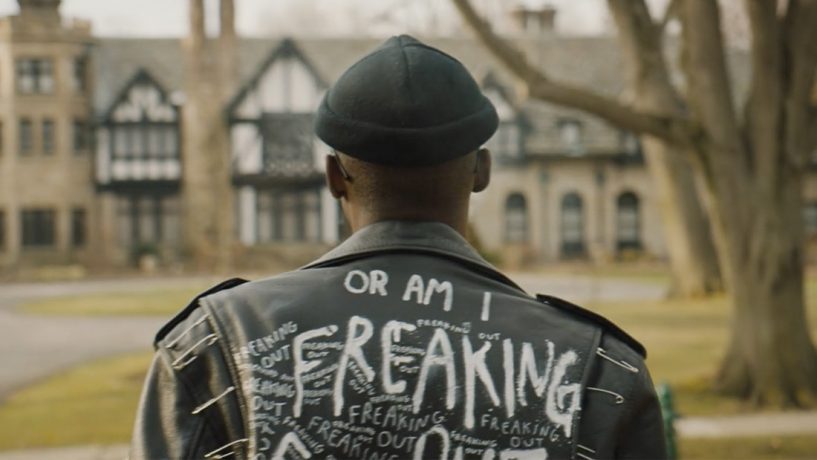
 Why we're excited:
Why we're excited:
